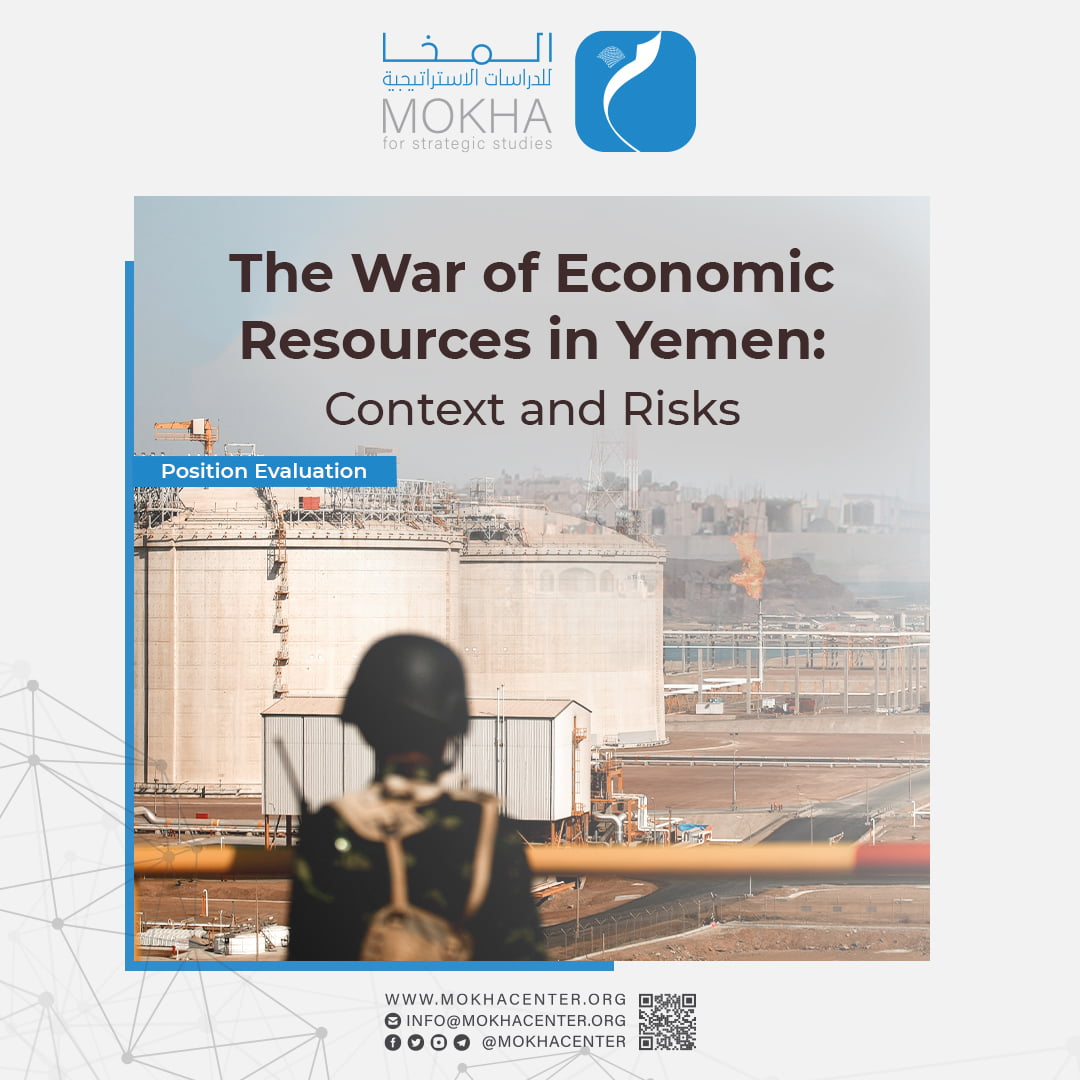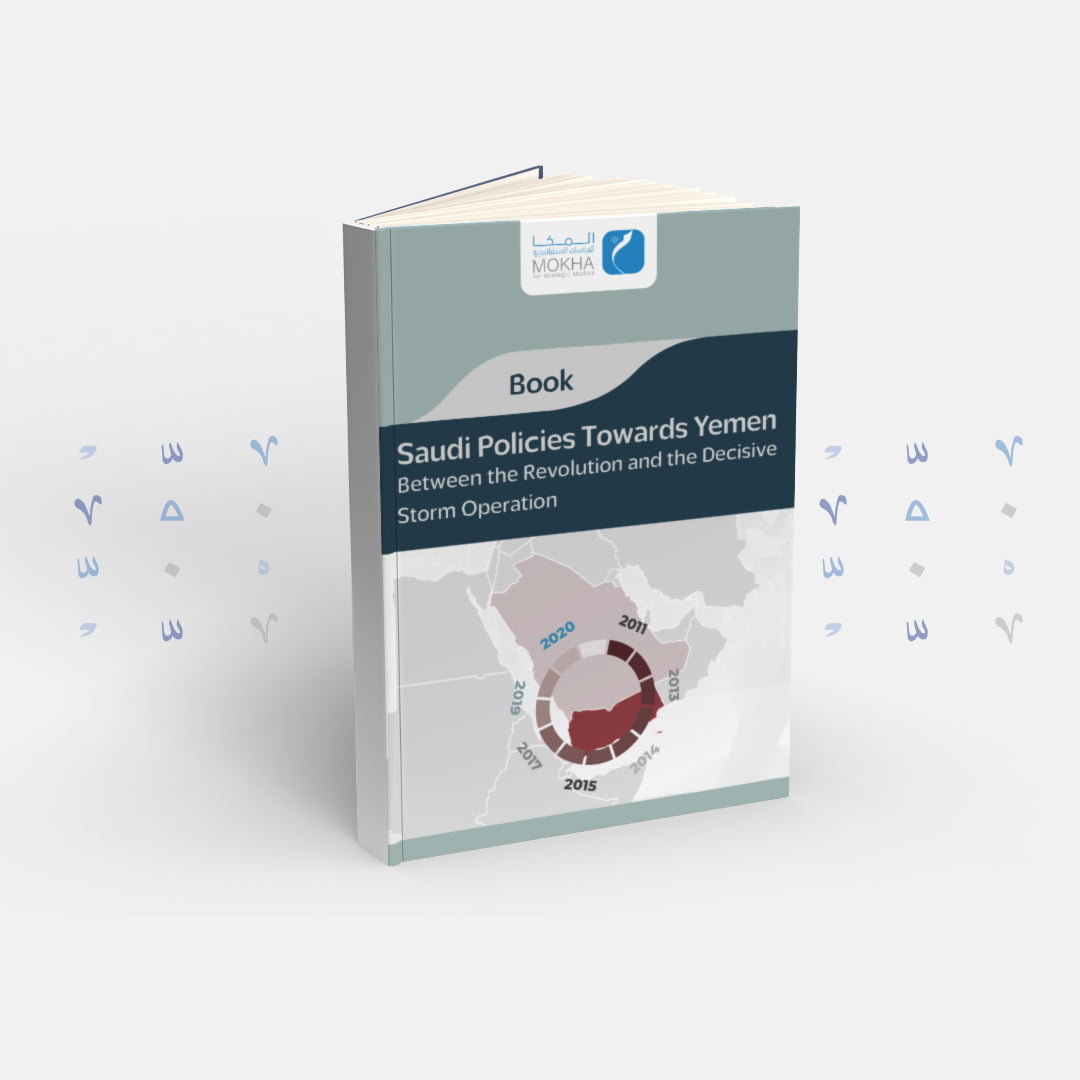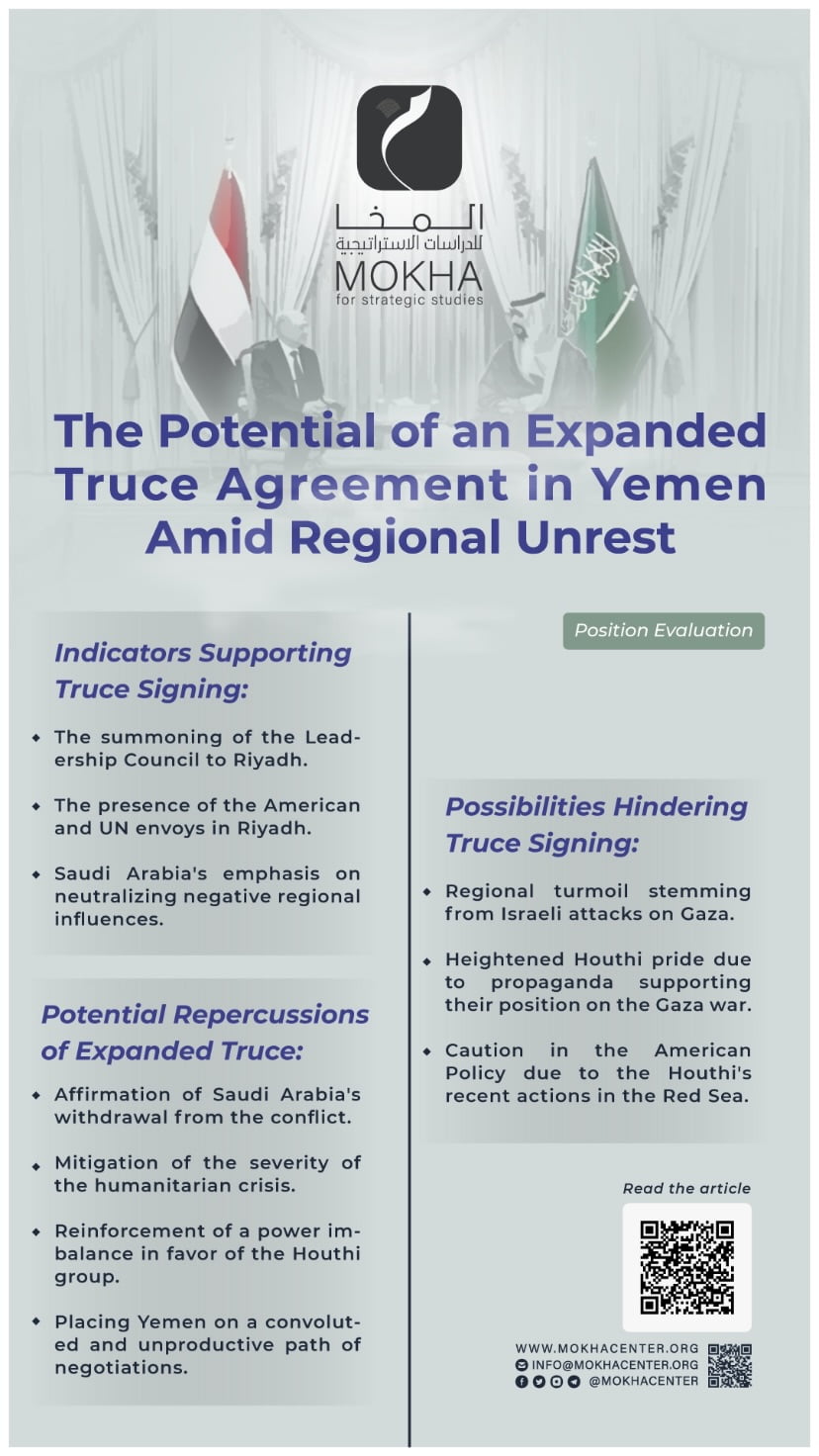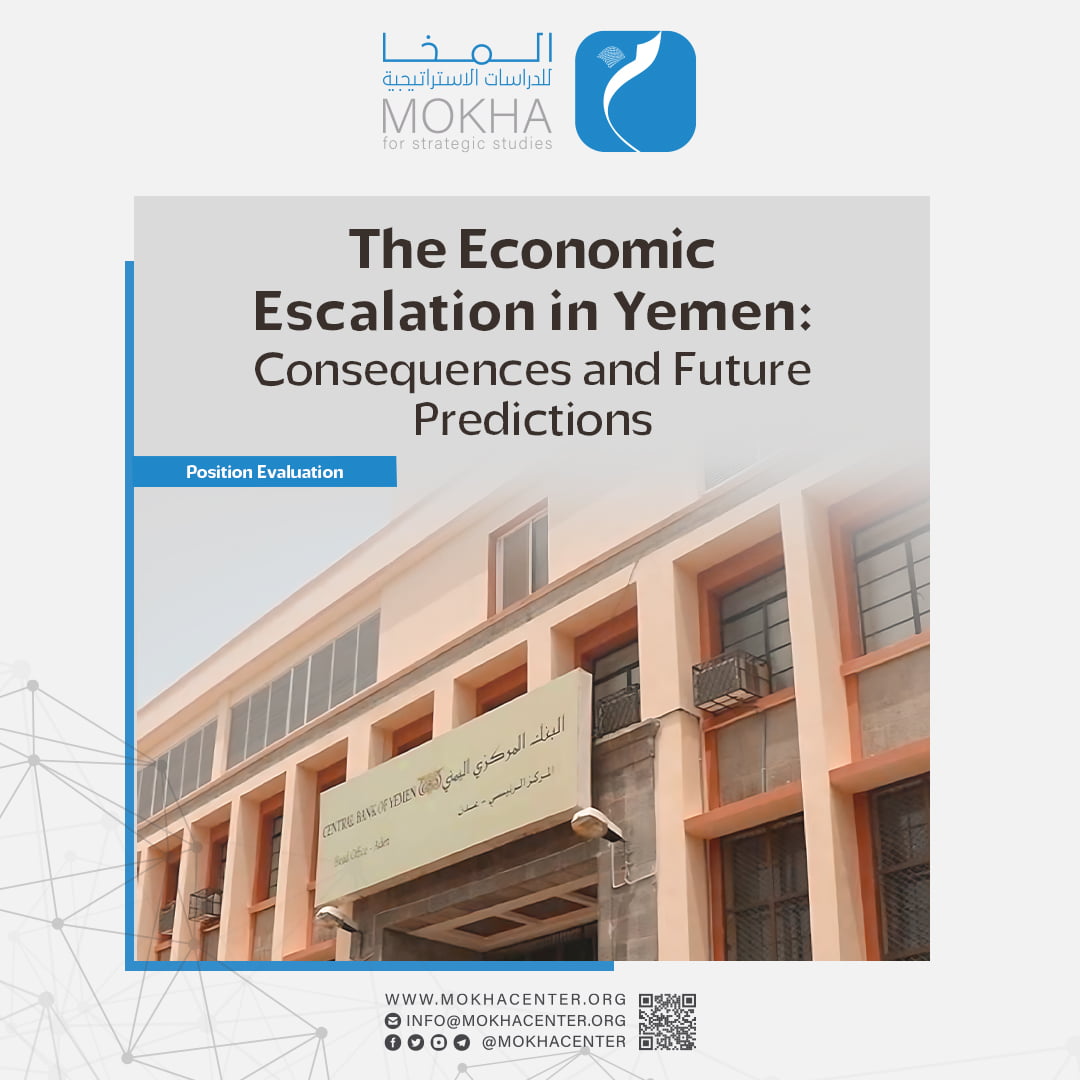The War of Economic Resources in Yemen: Context and Risks

| Getting your Trinity Audio player ready... |
Introduction
Over the past few months, Yemen has experienced a series of economic and political developments that have resulted in the deterioration of the economic resources controlled by legitimate authorities. The challenges faced by this authority have intensified, posing significant threats to its existence in the light of the change in the policies of the coalition countries Saudi Arabia and the United Arab Emirates, which are expected to have a supportive role within the government, and the country’s transition to what we can call the “war of economic resources”, which is a new phase of the conflict. This new phase of conflict involves the exchange of measures and procedures between the Houthis and the legitimate government, as well as between the legitimate government and the Transitional Council, where the objectives of these actions are either to gain control over the resources or to prevent and deprive the other party from accessing them. This type of conflict imposes a significant risk, including economic collapse, prolonged conflict. and increased divisions.
This paper deals with the nature of this war and its repercussions on the region.
Economic Resources in the Context of War:
The pace of the economic war coincided with the raging military war in the country, as the Houthis were desperate to control the country’s economic resources and utilize them to enhance their power. In turn, the coalition and the legitimate government adopted several measures aimed at weakening the Houthis economically and isolating them popularly, including the decision to transfer Central Bank headquarters to the interim capital, Aden, in September 2016.(1)
The war has had devastating repercussions on economic resources, as it led to the cessation of oil and gas production, so the amount of crude oil production and liquefied natural gas exports decreased by 67.8% and 80.3%, respectively, in 2015, compared to 2014. Moreover, the Aden refinery stopped refining oil, the production of the Ma’rib refinery decreased by 4.8%, and the quantities of oil derivatives imports decreased by 65.3% at the beginning of the war, which has led to a scarcity of fuel supply in the local market. (2)
The citizens have suffered from a severe crisis in oil derivatives and domestic gas, and the country has slipped into a division in the monetary and financial system. Each party has taken measures against the other, and the humanitarian situation deteriorated dramatically. Tens of thousands of employees in Houthi-controlled areas have been deprived of their salaries to this day, and citizens in the rest of the regions have suffered from unemployment, inflation and obscenely high prices, along with a severe crisis in oil derivatives and domestic gas.
In the context of the chaos in those areas due to entities outside the authority of the state, the military and political leaders affiliated with the Transitional Council proceeded to collect taxes without legal documents, while continuing to incite against legitimate governments under the pretext of corruption and failure to provide public services, especially the provision of electricity. Under these headings, it fought battles with the legitimate forces and managed to expel them from Aden, in August 2019.
After the formation of the Presidential Leadership Council, the issue of unifying revenues and transferring them to the government account in the Central Bank was one of the priorities that it must deal with. In this regard, the Leadership Council formed a higher committee for revenues, headed by a member of the Council and the head of the Transitional Council, Aidarous al-Zubaidi, and authorized it to fully deal with the revenue file, to make proposals for the collection of local and central revenues and to raise the names of any civil or military leaders that obstruct this in order to take appropriate measures against them. (4)
It is likely that the leadership council chose Al-Zubaidi to head the committee because most of those who collect resources are from the military and political leaders of the Transitional Council, which may avoid the leadership council clashing with them. The committee decided, in its first meeting, to assign the Ministry of Finance the task of issuing memorandums to the concerned authorities to oblige them to collect revenues, supply them to the Central Bank in Aden and prepare a list of violators to take legal measures.
In order to enhance its resources, the legitimate government tended to expand the production and export of oil after it had resumed its production and export in August 2016 from the Masila fields in Hadhramaut Governorate, where it was exported through the port of Al-Shihr and the Rudom-Nashima station. However, production remained suspended in the oil fields in Shabwa Governorate and the Safer fields in Ma’rib Governorate, due to the fall of the pipeline that transports oil to the port of Hodeidah on the Red Sea coast in the areas controlled by the Houthi group and the halt of exporting liquefied gas from the Safer field through the port of Balhaf in Shabwa Governorate, as a result of the lack of security protection and the port’s transformation into a military barracks for the Emirati forces, who refused to withdraw from it.
Yemen’s revenues from crude oil exports increased in 2021, reaching $1.418 billion, compared to $710.5 million in the previous year, an increase of $707 million, or 99.4%. According to a report issued by the Central Bank of Yemen, this is due to the increase in the Yemeni government’s share of the total value of oil exports to 75.1% in 2021, up from 60.3% in 2020, in addition to the rise in oil prices in global markets in the second half of last year.
A shift in the balance of economic power:
At the same time, the expenditures of the legitimate government continued to be at their highest levels, with the absence of any real efforts to curb corruption or access newly available resources and improve their management, including the operation of some ports and airports, etc. either because of its inability to do so or because of the corruption and chaos it suffers from.
It may be due to the position of the two coalition countries, who — perhaps — want to keep the legitimate government under the pressure of the need to be more responsive to their policies. More than that, the legitimate government suffered a painful economic blow, as the Houthis were able to prevent it from exporting oil in late October, and its problems were exacerbated further after the end of the Saudi oil grant to support electric power generation, and it was forced to spend millions of dollars daily to operate electrical stations in its areas of control, and the continuation of hindering the transitional council — in one way or another — from its ability to collect and manage resources.
A decline in coalition support:
Contrary to the first years of the war, the support provided by the two countries of the coalition to the legitimate authority declined, and this was not limited to the financial aspect but rather extended to the political and military aspects, in light of their keenness to avoid escalation toward the Houthi group. Examples of declining economic support include:
- The delay in responding to the economic challenges facing the Yemeni government, as Riyadh and Abu Dhabi did not respond to repeated calls to intervene to support the Yemeni economy until after 10 months had passed, in addition to that, they deposited only $1.3 billion into the Central Bank of Aden ($1 billion from Saudi Arabia, and $300 million from the Emirates), and this is contrary to their commitment to providing “urgent support” for the Yemeni economy, worth $3 billion, the day after the formation of the Leadership Council.
- The government has begun to cover the amounts related to the availability of oil derivatives necessary for electric power, from the resources it obtains, after the second grant of oil derivatives provided by Saudi Arabia to support electricity generation, which has not been renewed, ended last March, and this has turned into — according to the Central Bank’s governor — to a “black hole that devours all resources”. The provision of oil derivatives to operate the electric power costs the government, according to a statement, $55 million per month. From March 2022 until mid-June 2023, the government spent $150 million, which is a large amount that devours most of the revenues that are collected after the cessation of oil exports. The total grants provided by Riyadh to support oil derivatives amounted to $610 million, and it had a major role in reducing the general budget of the legitimate government.
Wrench:
The Houthis were able — at the end of October 2022 — to prevent the legitimate authority from exporting oil, after threatening the ships— although the narratives that were presented in stopping the export were contradictory and unconvincing — but in all cases, the legitimate authority was deprived from main resources since that date until mid-June 2023, the government lost a major source of hard currency, amounting to nearly $1 billion. More than that, the lax policies of the two countries of the coalition allowed the Houthis to adopt a number of measures that greatly affected the financial position of the legitimate government.
Allowing commercial ships to reach the port of Hodeidah without inspection, contrary to what was the case in the past, deprived the legitimate government of 700 billion riyals in taxes and customs in recent months, supplied the Houthi treasury with the same amount and perhaps more. These policies enabled the Houthi group to put pressure on merchants to unload their goods through the Port of Hodeidah, not Aden, knowing that importing through the port of Hodeidah involves additional privileges for merchants in terms of the proximity of the port of Hodeidah to the capital, Sana’a, and areas with high population density, and, due to the large difference in the price of the customs declaration, the legitimate government has made a decision to raise the value of the customs dollar for imported goods — with the exception of basic goods — to 750 riyals for $1 instead of 500 riyals, while the Houthis kept it at 250 riyals.
It is expected that if the coalition policies continue in this way, a large number of merchants will transfer the import line of their goods through the port of Hodeidah, despite the legitimate government’s promise to take punitive measures against them. Opening the port of Hodeidah to various commodities allows the Houthis to import domestic gas from abroad, which provided them with an alternative from which they can earn large sums of money, and enabled them to prevent the transfer of Ma’rib gas to the areas under their control, in a deliberate behavior on their part to deprive the legitimate government of hundreds of millions of riyals.
Transitional obstruction:
Reports indicate that influential personalities belonging to the Transitional Council have continued to impose their control over a number of revenue vessels in Aden and a number of other areas. Moreover, the transitional government continues to obstruct the government and extorts it, even though it is a participant in it. For example, in recent weeks, it has adopted a campaign against the government, taking advantage of popular anger over the deterioration of electricity, in the summer as temperature rises.
In a clear attack on economic resources, the governor of Aden affiliated with the transitional government, Ahmed Lamlas, decided to prevent the supply of revenues to the Central Bank. The National Assembly of the Transitional Council supported the decisions and called for the formation of an autonomous administration to lead the southern governorates of the country and a southern leadership for the Central Bank of Yemen in Aden.
In any case, the STC’s dispute with the government often reflects negatively on the government’s performance and economic indicators, including currency exchange rates and subsequent inflation.
Implications and risks
There is no doubt that this round of conflict, which centers around resources, will have very dangerous repercussions, especially as it takes place in a country that has been exhausted by eight years of war and is already suffering from limited resources and a high population density. Among the possible repercussions of this economic war are the following:
1- Widening circle of misery and deprivation
The most cruel aspect of this war is that it revolves around citizens’ livelihoods, their sources of income and the level of governmental services they receive. As the national currency, prices and resources decline, the legitimate government may be unable to pay salaries on a regular basis, and it may have to cover that from inflationary sources, which will lead to a significant collapse in the value of the national currency, as this will be expanded on toward a great state of suffering and misery.
It is also expected that the difficulties that hinder the provision of public services by the government, especially electricity, will continue, and, with it, the suffering of the people in Aden and the rest of the coastal cities, especially in the sweltering summer months.
2- Possibility of depleting cash reserves and deposits
The continuation of the situation as it is may force the legitimate government to use the reserves and liquid balances of currencies that the Central Bank possesses in international banks, such as Switzerland and gold bullion in the U.S. Federal Reserve, as hinted by the governor of the Central Bank, which is a situation that entails great risk. Its depletion is very dangerous and seriously harms the rights of future generations.
- The inability to secure the import of strategic commodities
If the situation continues as it is, the Central Bank may be unable to secure hard currency for the import of essential commodities, such as wheat, flour, rice, infant formula, and oils, whose import bill amounts to $3.23 billion, almost one-third of which (i.e., more than $1 billion) is directed to secure the import of wheat, however, the wheat import bill was constantly rising, as it increased from $700 million in 2019 to $858 million in 2020, and to $1 billion in 2021. If the Central Bank is unable to secure the import of these strategic commodities, Yemen may witness the risks of famine, and it may slip into total chaos. The bank’s statement regarding the postponement of the weekly foreign currency sale auction.
4- An imbalance that is not conducive to stability or peace
Previous developments have led to an economic imbalance in favor of the Houthi group — at least in public terms — but this imbalance will not often alleviate the suffering of citizens, including those living in the Houthi-controlled areas, as the group neutralizes the resources, they obtain from reaching the citizens in salary form and others. Despite the large resources in their hands, they refuse to hand over salaries and other things, and this imbalance will not lead to peace due to the widespread popular rejection of the Houthi group’s authority.
Recommendations for Policymakers:
Although the margin of action appears to be limited in front of the legitimate authority, many things can be done, including:
- Pressure to hold a meeting that brings together the leadership council with the Saudi crown prince and the president of the United Arab Emirates, and push for the formation of a mini-government: it will manage the economic file and give it powers, competencies and conditions that enable it to access all available resources and make good use of them.
- Rationalizing expenditures and making the cost of governance and the burdens of displacement to the narrowest limits: If the legitimate authority falls on reducing the salaries, allowances and rewards specified for the president and members of the leadership council, the prime minister and members of the government, deputies and undersecretaries of ministers, heads of departments and agencies and others, and making them within the narrowest limits possible. The same applies to the monthly subsistence salaries provided by the government to a number of displaced officials outside Yemen, as many of them receive inflated salaries in hard currency that are not commensurate with the economic conditions in the country.
- Involving international parties in facing economic challenges, especially the countries of the European Union, the United States and international and regional financing institutions.
- Revitalizing oversight institutions, foremost of which is the Presidency of the Council of Representatives and its committees, or at least a number of them, the Shura Council, and the Central Organization for Control and Accountability and activating its oversight role.click to download the article
References
- Al-Masdar Online, A decision to transfer the Central Bank to Aden, appoint a new governor and reconfigure its board of directors, available at https://almasdaronline.com/article/84644
- Ministry of Planning and International Cooperation, Economic Studies and Forecasts Sector, Bulletin of Economic and Social Developments in Yemen, Issue (14), available at the following link: https://shortest.link/6aML
- Dr. Nasser Muhammad Ali Al-Taweel, Transformations of the Southern Issue after the Military Intervention of the Arab Coalition Countries, Arab Foundation for Strategic Studies, Istanbul – Turkey, 2022: p. 184.
- A higher committee for revenue headed by Al-Zubaidi.. an open battle against the war mafia, News Yemen website, on: 8/16/2022, available at the following link: https://newsyemen.net/new/86780
- Headed by Al-Zubaidi.. The Resources Committee begins controlling the revenue system, Aden City website, on: 9/19/2022, available at the following link: https://www.aden-city.net/news/10356
- Government report: Yemen’s oil revenues will rise to $1.4 billion in 2021, sourced online on: 2/5/2022, available at the following link: https://almasdaronline.com/articles/251067
- The UAE deposits 300 million dollars in the Central Bank of Yemen account, available at the link: https://thenewkhalij.news/article/282899
- The Kingdom deposits one billion dollars as a deposit in the account of the Central Bank of Yemen, the Saudi Press Agency, available at the link: https://www.spa.gov.sa/w1857611
- Saudi Arabia and the UAE provide 3 billion dollars in urgent support for the Yemeni economy, Al Arabiya Net, available at: https://cutt.us/y8nC2
- A government source explains in detail the government’s spending on the electricity sector and is surprised by the speech of the Governor of Aden, the Yemeni News Agency (Saba), on: 6/18/2023 AD, available at the following link: https://www.sabanew.net/story/ar/98798
- The governor of the Central Bank of Yemen refutes the rumors: the bank’s reserves abroad are “larger than you can imagine” and are for generations and cannot be neglected, Al-Masdar Online, on: 13/6/2023 AD, available at the following link: https://almasdaronline.com/articles/275852
- – Yemen. The government defends its decision to increase the price of the customs dollar, Anatolia Agency, at the link: https://cutt.us/E8ejk
- Republic of Yemen, Ministry of Industry and Trade, Annual Report 2022, p.: 39.
- – the same source




